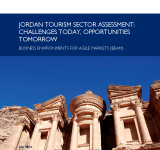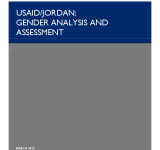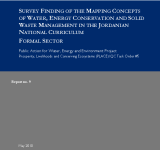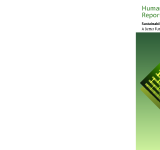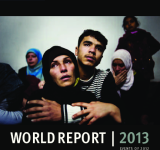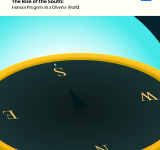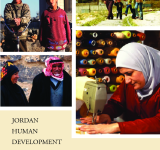The tourism sector assessment report examines critical questions related to Jordan's best opportunity areas for tourism development growth that will result in increasing tourism receipts;; private-sector investment in tourism;; and tourism-related employment. The report identifies global trends;; best practices;; and benchmarks shaping tourism demand and competitiveness. It also suggests approaches for expanding tourism in key Jordan governorates and secondary destination in ways that benefit local communities. According to the assessment;; Jordan is well-positioned to move from a regional;; multi-country tourist destination to a stand-alone destination with a portfolio of tourism products with year-round appeal for foreign and domestic visitors;; and this will require a long-term commitment from both public and private stakeholders. It suggests collaboration between Jordan's government and private sector;; localized and inclusive economic development implementation strategies and increase in the supply of skilled tourism workforce professionals.
human
The report presents an up-to-date analysis of gender disparities in Jordan to inform development assistance programs by the USAID for the 2013-2017 strategic plan. The assessment report is prepared by the Global Health Technical Assistance Project;; funded by USAID Jordan and therefore;; it is based on a literature review and field work of the 21 focus group discussions held in Amman;; Irbid;; Tafileh and Zarqa. The report establishes that Jordan has begun to transition to a knowledge-based economy with the national advantage as its people. It also points out that despite the investments that have helped address gender equality issues;; Jordan continues to bear low female participation in the labor markets;; gender stereotypes about the role of females and males and conservative cultural norms. The report includes a sector-by-sector analysis;; recommendations;; gender review and an illustrative implementation plan. It concludes with key recommendations on the wide breadth of the USAID Jordan portfolio with a key emphasis on gender issues.
This report addressed CEDAW Committee by providing a solid and up-to-date information set and analysis of positive policies and legislation taken for women’s advancement and weaknesses that are delaying progress and sustaining disparities. The report covers six components: 1. Jordan’s reservations on CEDAW;; 2. Harmonization of CEDAW into legislation;; 3. Political representation;; 4. Violent against women;; 5. Equal rights in the family;; 6. Conditions of vulnerable and marginalized women. It also provides an overall assessment of the six components covering 3 areas: assessment of the official efforts towards the implementation of CEDAW;; also;; assessment of the civil society efforts and strategies towards monitoring Jordan’s commitment to obligations;; and suggested recommendations for the new concluding observations.
The study aims to evaluate the concepts of water;; energy and solid waste that exists in the curriculum and the manner in which they are tackled by mapping the current textbooks based the three themes of the study – water;; energy and solid waste. The report is based on a comprehensive study of 104 school textbooks from grades 1 – 10 in fourteen subjects. The survey finds that the environmental education concepts were vastly covered in all subjects of he study in a total of 1777 concepts;; and most of them focused on scientific facts and information with repetitive energy concepts and lack of sequential flow. This research was conducted as part of the Public Action for Water;; Energy and Environment Project (PAP);; which aims to encourage water and energy conservation and to support behavior change towards more conservation and efficient practices both at the household level and in the commercial;; industrial and civil society arenas using social marketing behavioral methods. Based on the finding that there is little space allocated to the synthesis and application of information and knowledge and therefore the concepts remain superficially tackled;; the report recommends that support material should be prepared for the different grade levels and training programs should be developed for the teachers as real agent of change and role models.
The 2011 Human Development Report argues that the urgent global challenges of sustainability and equity must be addressed together – and identifies policies on the national and global level that could spur mutually reinforcing progress towards these interlinked goals. Past Reports have shown that living standards in most countries have been rising - and converging - for several decades now. Yet the 2011 Report projects a disturbing reversal of those trends if environmental deterioration and social inequalities continue to intensify;; with the least developed countries diverging downwards from global patterns of progress by 2050. The Report shows further how the world's most disadvantaged people suffer the most from environmental degradation;; including in their immediate personal environment;; and disproportionately lack political power;; making it all the harder for the world community to reach agreement on needed global policy changes. The Report also outlines great potential for positive synergies in the quest for greater equality and sustainability;; especially at the national level. The Report further emphasizes the human right to a healthy environment;; the importance of integrating social equity into environmental policies;; and the critical importance of public participation and official accountability. The 2011 Report concludes with a call for bold new approaches to global development financing and environmental controls;; arguing that these measures are both essential and feasible.
This 23rd annual World Report summarizes human rights conditions in more than 90 countries and territories worldwide in 2012. It reflects extensive investigative work that Human Rights Watch staff has undertaken during the year;; often in close partnership with domestic human rights activists.
The 21st century is witnessing a profound shift in global dynamics;; driven by the fast-rising new powers of the developing world. China has overtaken Japan as the world's second biggest economy;; lifting hundreds of millions of people out of poverty in the process. India is reshaping its future with new entrepreneurial creativity and social policy innovation. Brazil is raising its living standards by expanding international relationships and antipoverty programmes that are emulated worldwide. But the “Rise of the South” is a much larger phenomenon. Indonesia;; Mexico;; South Africa;; Thailand;; Turkey and other developing countries are becoming leading actors on the world stage. The 2013 Human Development Report identifies more than 40 developing countries that have done better than expected in human development in recent decades;; with their progress accelerating markedly over the past 10 years.
This report consists of eight chapters and aims to summarise the key concepts of human development. It introduces the Human Development Index;; provides an overview of Jordan's human development achievements;; examines the regional vulnerability context that has constrained Jordan's options in its pursuit of social and economic development;; provides a platform for the poor to express their views and perceptions in relation to their poverty status;; reviews the policies;; institutions and processes that affect the poor;; examines the government's attempts to stimulate entrepreneurialism;; promotes the application of a rights-based approach;; in which all citizen are equally empowered and have the capacity and the appropriate enabling environment that allows them to claim their entitlements according to law. Finally;; the study examines the various reform initiatives in progress and assesses the extent to which Jordan is committed to the process.
